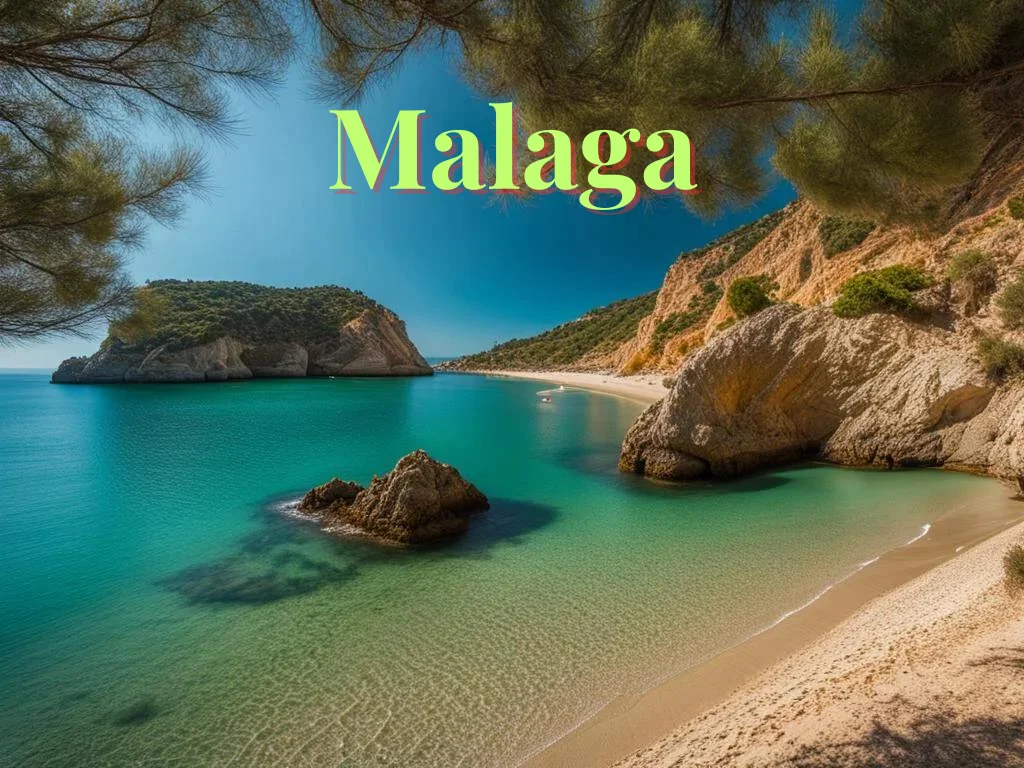Disclaimer: I have affiliate links in this post and receive a commission on any purchases you make at no cost to you. It’s one of the ways I support my site.
Welcome, traveler, to the sun-soaked shores and historical streets of Malaga. It’s a hidden gem in the heart of Andalusia’s famed southern coast. This guide will whisk you on a journey through Malaga tourism. It is blessed with an enchanting mix of cultural heritage and contemporary charm. You’ll visit majestic fortresses and pristine beaches. Discover an array of things to do in Malaga. Every step uncovers rich history, and every turn presents vibrant street scenes. You will be sure to capture your wanderlust.
Whether you’re sifting through the vast mosaic of attractions the city has to offer or charting your course, our travel guide ensures you don’t miss out on any of the city’s treasures. Unveil iconic landmarks steeped in time. Unwind at stunning Mediterranean beaches. Indulge your palate with delectable Andalusian cuisine. Malaga beckons you to embrace its storied past and spirited present. This sets the stage for an unforgettable Spanish escapade.
Key Takeaways
- Immerse yourself in the rich tapestry of the city’s history and culture.
- Encounter the beauty of Andalusian architecture and Islamic artistry.
- Experience the vibrant local art scene, from centuries-old masterpieces to contemporary street murals.
- Relax on the sublime beaches that define the city’s coastal allure.
- Sample the gastronomic delights that tell the story of Malaga’s culinary heritage.
- Navigate the ancient and modern streets, where the essence of Spain comes alive.
Discovering Malaga’s Moorish Heritage: Unveiling the Alcazaba and Gibralfaro Castle
The Alcazaba de Málaga and the Castillo de Gibralfaro are not only historical attractions. They are storied landmarks that define the very essence of Malaga’s Moorish past. Steeped in centuries of history, they epitomize Malaga’s Moorish past. These structures are a testament to a time when Islamic architecture left a lasting imprint on the city’s cultural landscape. Your journey to Malaga presents a unique opportunity to marvel at the architectural brilliance of these monuments. You can also immerse yourself in the splendor of an epoch characterized by artistic and cultural richness.
The Alcazaba: A Testament to Malaga’s Islamic Past
The Alcazaba de Málaga has robust walls and a strategic position overlooking the city. It’s more than an imposing fortress. It’s a doorway into the richness of the 11th-century Moorish era. As you traverse its intricate passageways, you are greeted by lush courtyards. They narrate stories of a bygone era through their silent fountains. Their ornate arches also contribute to the tale. Each step through the Alcazaba is a move through history. Each stone is imbued with tales from the Nasrid period.
Castillo de Gibralfaro: Panoramic Views of Malaga, Spain
Climb further to the summit, where the Castillo de Gibralfaro stands as a proud guardian of the city. Here, history and spectacle converge. The castle’s rugged ramparts offer some of the most stunning panoramic views across the city. Imagine looking out towards the horizon, where the shimmering Mediterranean meets the sky. The city’s urban tapestry sprawls beneath you. The Castillo de Gibralfaro is an essential milestone. It helps people understand the cultures that have flourished in Malaga over the centuries. It helps to comprehend their layers.
Whether you’re a history enthusiast or simply in pursuit of discovering Malaga’s unique heritage, these monuments stand as silent narrators of the city’s storied past. Their preservation allows us to recall the magnificence of a time when the Moorish reign brought about a golden age of artistry and architecture. Visiting these sites is an unforgettable highlight of your journey in the heart of Andalusia.
Malaga’s Architectural Marvel: The Majestic Malaga Cathedral
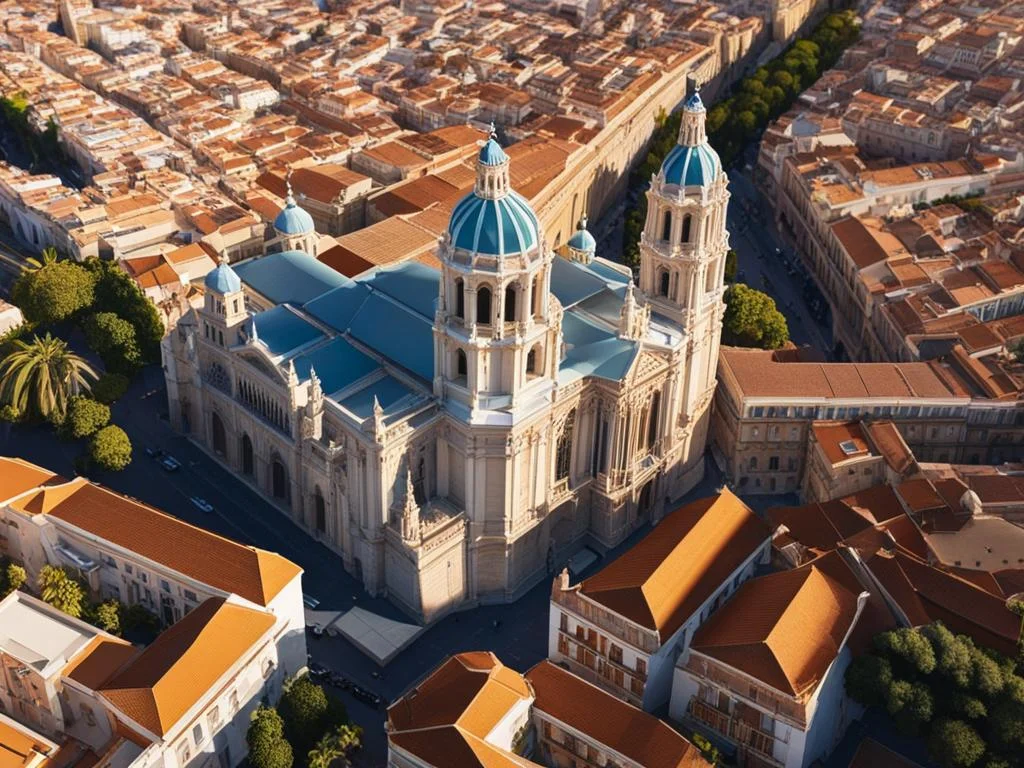
The resplendent Malaga Cathedral stands tall amidst the bustling streets of the city. It is a testament to the grandeur of Spanish Renaissance and Baroque architecture. Known as “The One-Armed Lady” or La Manquita, this iconic structure was commissioned by the Catholic Monarchs in the 16th century. It remains one of the most significant religious sites and city landmarks to this day.
La Manquita: The One-Armed Lady
Intrigued by its quirky nickname? La Manquita owes its nickname to the unfinished second tower. This unique feature adds a touch of quirk to its otherwise symmetrical façade. Explore this architectural masterpiece. You’ll be immersed in history, faith, and art. You’ll slowly unravel the story behind its charming asymmetry.
Climbing to the Heavens: The Cathedral’s Tower
For those yearning for a heavenly view, the cathedral’s tower beckons. Ascend the 200 steps. At the top, you will be rewarded with an awe-inspiring 360-degree panorama. The view stitches together the historic Alcazaba. It also showcases the glistening Mediterranean Sea. It also showcases the vibrant tapestry of Malaga’s cityscape.
| Feature | Description | Historical Significance |
|---|---|---|
| La Manquita, Second Tower | The architectural style is evident in the grandeur of the cathedral’s design. | The architectural style is evident in the grandeur of the cathedral’s design. |
| Spanish Renaissance | Ornate features were added in the 17th and 18th centuries. | Reflects the period of religious and artistic rebirth in Spain following the Reconquista. |
| Baroque Enhancements | The architectural style is evident in the grandeur of the cathedral’s design. | Emphasis on dramatic art and architecture following the Renaissance period. |
Malaga Cathedral stands as a beacon of cultural and spiritual heritage. Whether you’re captivated by tales of the past or simply seeking unparalleled views. As you tread its sacred halls, you’re not just a spectator but a part of its living legacy.
Stroll Through History: The Roman Theater and Malaga’s Ancient Roots
Discover the Malaga Roman theater. It’s an emblematic treasure hidden within the city’s modern rhythms. As you set foot on the site of the ancient ruins, you’re not just visiting a landmark. You’re stepping back into the 1st century AD. Imagine the grandeur of performances held under the watchful eyes of Roman citizens. The theater’s semicircular orchestra and tiered seating resound with the echoes of history.
The splendor of the city’s ancient groundwork is most palpable at this site. It is a pinpoint on every historian’s map for the vastly rich Roman heritage it represents. Its reemergence from centuries of slumber signified a renaissance for Roman history enthusiasts. It also marked a renaissance for archaeologists. Its chance discovery in 1951 sparked this renaissance.
“The Roman Theater resurfaced like the sun unveiling at dawn. It tells tales of grandiosity. It is Malaga’s transition from the ancient world to the contemporary stage.”
At the Roman Theater, you can meander through the remnants of architectural mastery. You can touch the same stones that have withstood the tides of epochs. This site breathes life into the historical landmarks of the city. It showcases the intricacies of ancient engineering. It invites the imagination to conjure the spectacles of the past.
It’s captivating to witness how the city has meticulously preserved the Roman Theater’s ambiance. The rising radiance of the two creates a portal to an era. Roman rule carved its law, art, and spirit into the very bedrock of the cities it touched. It is adjacent to the Alcazaba.
- Step on the well-worn slabs where senators and citizens once trod.
- Gaze upon the tiered seating area, envisioning the social tapestry of ancient spectators.
- Feel the hushed whispers of the past as the stage seems set for another timeless performance.
This locale is more than an archeological wonder. It is a live chronicle that continues its narrative through outdoor performances. The theater is still used for performances today. As contemporary productions begin, performers and audience members feel the pull of tradition. The venue vibrantly fuses the city’s past with its cultural present.
When exploring Malaga, be sure to dedicate time to this remarkable convergence of ancient ruins and artistic expression. The Roman Theater isn’t just an idle monument. It’s a continuous celebration of the city’s rich, multifaceted Roman heritage.
Malaga’s Cultural Tapestry: Museums You Can’t Miss
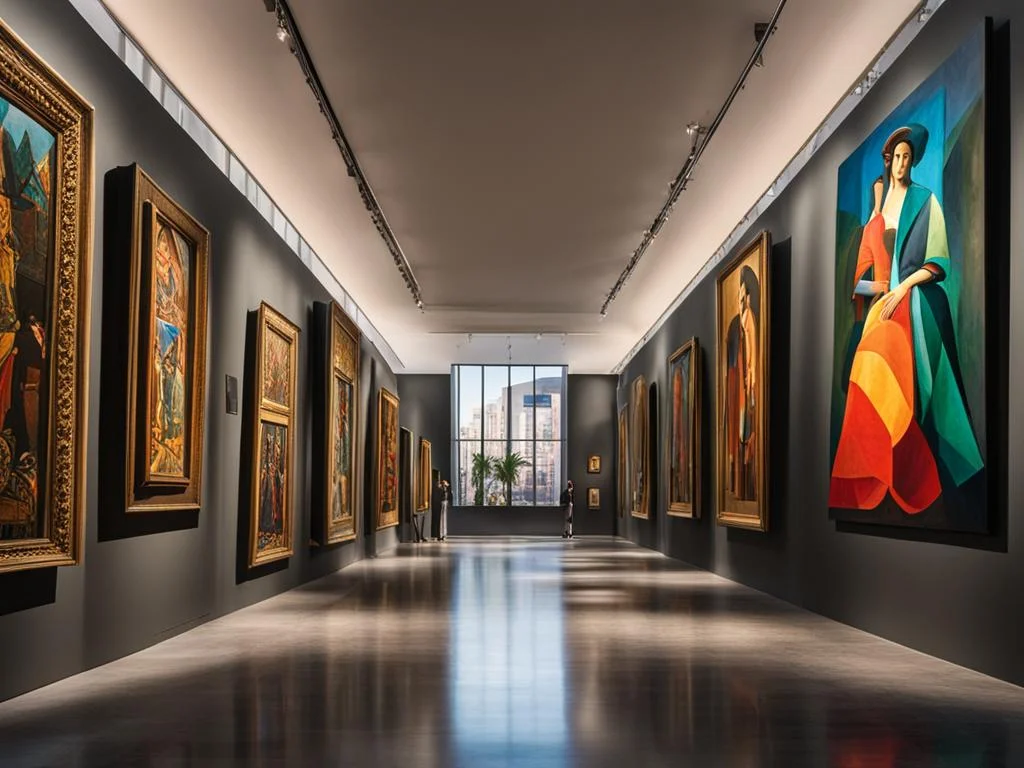
Meander through the sun-kissed streets of Malaga, Spain a city resonating with artistic verve. Your cultural voyage beckons you towards its most treasured institutions. These repositories of art and history offer more than mere visual splendor. They encapsulate the very essence of the cultural capital of Andalusia. Embark on this enlightening journey. Allow the allure of creativity to enrich your soul.
Museo Picasso Málaga: A Homage to the Iconic Artist
The Museo Picasso Málaga stands in the heart of where Picasso spent his childhood. It’s a monument to the enigmatic genius that reshaped modern art. The museum has an all-encompassing array that covers his extensive oeuvre. It enlightens visitors about his innovative spirit. It also reveals the profound narrative in his works.
Carmen Thyssen Museum: A Window into Andalusian Art
Step into the Carmen Thyssen Museum. Find yourself immersed in the vivid storytelling of Andalusian paintings. The museum’s collection showcases the diversity and depth of Spanish artistry. It displays works that capture the region’s rich heritage and vibrant vistas.
Centre Pompidou Malaga: Contemporary Art on the Waterfront
The Center Pompidou Malaga is a beacon of modern expression. It’s where the Mediterranean Sea meets the contemporary enigma. As you explore the grandeur of innovative creations, reflect on the dynamic collision of tradition and modernity. This collision defines Malaga’s art scene.
| Museum Name | Type of Collection | Notable Features |
|---|---|---|
| Museo Picasso Málaga | The life works of Pablo Picasso | Picasso’s personal artifacts and early works. |
| Carmen Thyssen Museum | Andalusian paintings | 19th-century Spanish art focuses on Andalusian subjects. |
| Centre Pompidou Malaga | Contemporary art | 19th-century Spanish art focuses on Andalusian subjects. |
Exploring the Old Town: A Journey Through Malaga’s Historic Core
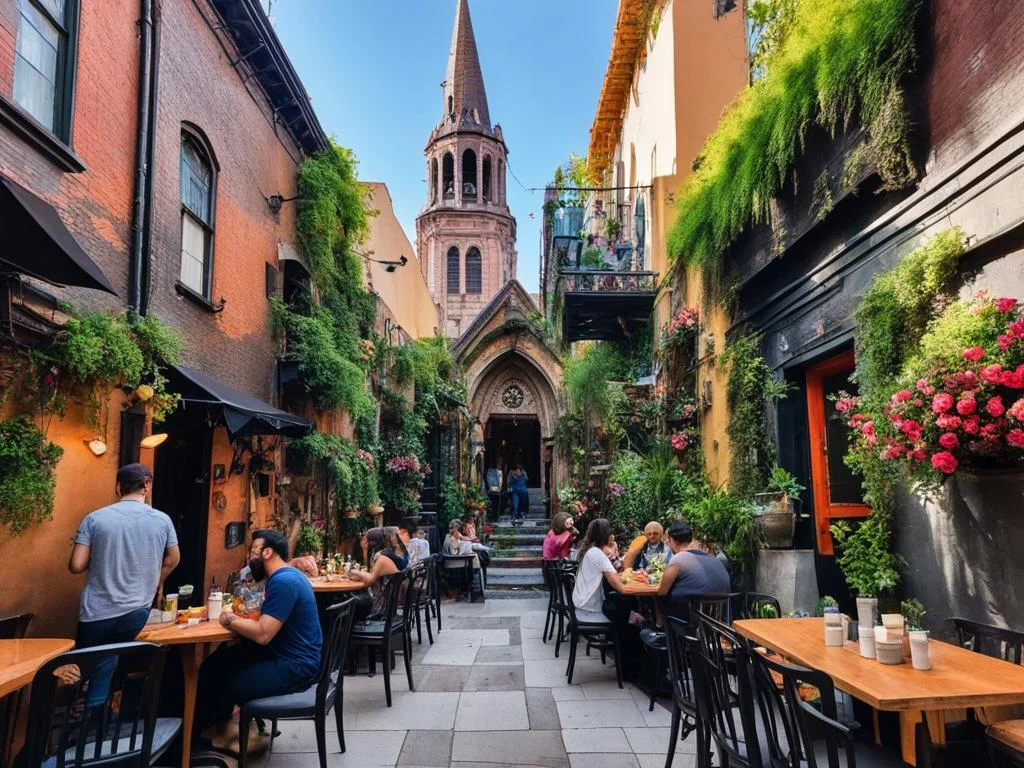
Breathe in the essence of southern Spain as you meander through the historic center of Málaga. This area encapsulates the soul of the city. As you traverse the pedestrian lanes, let the cobblestones guide you through ancient squares. They echo tales of times gone by and past centuries-old facades. Here, the present dances with the past, offering an enchanting city exploration experience.
The old town is dotted with intimate boutique shops. Local merchants proudly display their artisan crafts there. Stop to relish a strong Spanish espresso at one of the myriad outdoor cafés, observing the hum of daily life. Plaza de la Constitución is the gastronomic heartbeat of the area. It beckons with its many tapas restaurants. Each is a doorway to authentic Andalusian flavors.
| Plaza or Highlight | Attraction Type | Experience Offered |
|---|---|---|
| Plaza de la Constitución | Central Square | Historic architecture, café culture, and local shopping |
| Pedestrian Lanes | Historic Walkways | An intimate stroll through Malaga’s past and present |
| Ancient Squares | Historic Sites | Windows into the social and cultural fabric of old Malaga |
| Iglesia de San Juan Bautista | Church | Awe-inspiring examples of Gothic, Mudéjar, and Baroque styles |
Every step you take is a step through time; the city’s glorious history unfolds around you with every turn. Trust your curiosity, and let it lead you to discover hidden corners and secret spots. They enrich your journey’s tapestry. Málaga’s old town is not just a destination. It’s an immersive narrative waiting to be read—one stone, one plaza, and one laneway at a time.
Mediterranean Paradise: The Pristine Beaches of Malaga
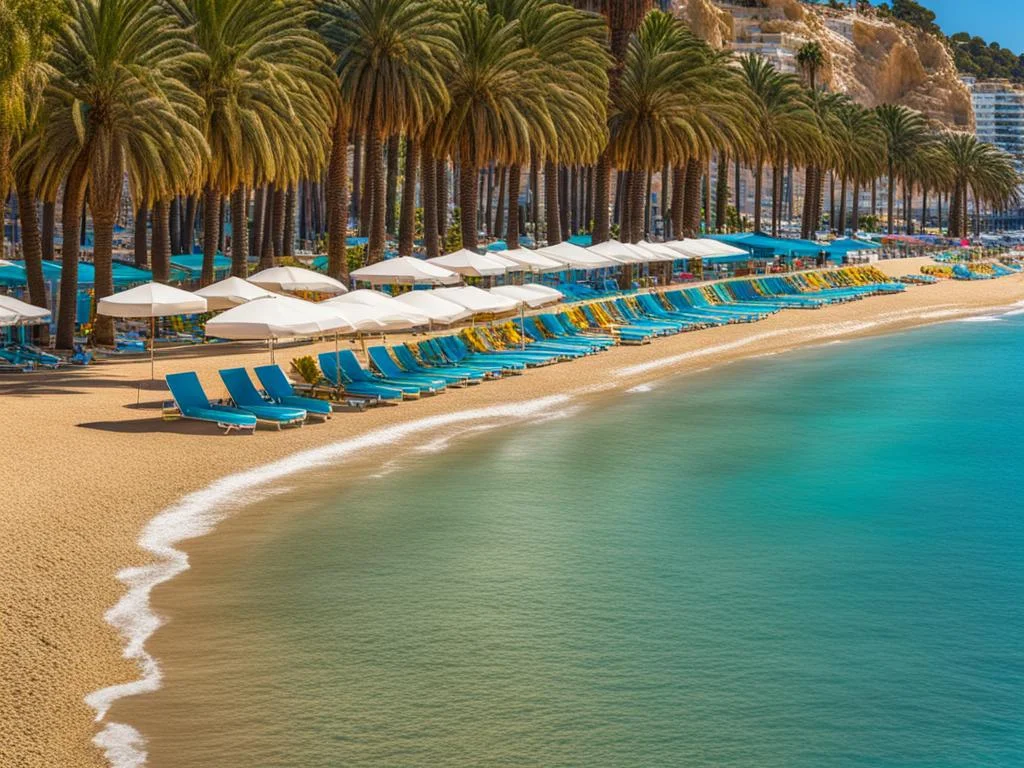
As you venture into the heart of Malaga, you’ll be enticed by the Mediterranean’s azure waters. They invite you to experience some of Spain’s most beautiful beaches. Whether you’re seeking sun-soaked relaxation or the vibrant atmosphere of coastal life, Malaga’s beaches offer something special for every traveler.
Playa de la Malagueta: Sun, Sea, and Sand in the Heart of the City
Unwind on the warm sands of Playa de la Malagueta. The beach is treasured for its convenient city location and inviting Mediterranean waters. Its proximity to the city’s bustling port adds a unique charm. It provides easy access to beachside bliss without straying far from urban amenities.
Seaside Relaxation at Playa de Pedregalejo and El Palo
Explore the serene shores of Pedregalejo and El Palo. The atmosphere shifts to a more tranquil pace there. These neighboring beaches are cherished for their family-friendly vibe. They are also loved for their connection to local life. Clusters of traditional chiringuitos are scattered along the coast. You’re never too far from indulging in the freshly grilled sardines the city is famed for. Immerse yourself in the charms of these beautiful beaches by the Mediterranean Sea. Engage in true coastal relaxation.
| Beach Name | Location | Amenities | Activities | Local Cuisine |
|---|---|---|---|---|
| Playa de la Malagueta | City center, east of the port | Loungers, parasols, and showers | Sunbathing, swimming, volleyball | Chiringuitos with espetos de sardinas |
| Pedregalejo | East of Malagueta | Kids’ play areas, workout stations | Paddleboarding, kayaking | Seafood restaurants, tapas bars |
| El Palo | Further east of Pedregalejo | Promenade, changing rooms | Beach soccer, promenade walks | Beach bars with local fish dishes |
Malaga’s beaches guarantee moments of joy and serenity. You can choose the vibrant Playa de la Malagueta. The area has the welcoming stretches of Pedregalejo. Or you can enjoy the seaside tranquility of El Palo. They are punctuated by the rhythmic ebb and flow of the Mediterranean Sea.
Gastronomic Delights: Savoring Malaga’s Culinary Offerings
When you set foot in Malaga, culinary artistry is an essential part of the local culture. The Atarazanas market and the surrounding tapas bars are more than just places to eat. They are vibrant showcases of the city’s cuisine. Each stall and kitchen brims with the bountiful flavors of Andalusian gastronomy.
Atarazanas Market: A Feast for the Senses
Amidst the hustle and bustle of Malaga’s historic heart lies Atarazanas Market. This culinary cathedral’s origins date back to the 14th century. The market’s grand arcade is adorned by a 19th-century stained-glass facade. It acts as a gateway to a treasure trove of fresh Andalusian foodstuffs. From glistening seafood to ripe, sun-kissed fruits and artisan cheeses. Each step through this market is a journey. It’s a rich tapestry of local specialties.
Tapas and Local Cuisine: Sampling Malaga’s Signature Dishes
Exploring the market is bound to whet your appetite. It invites you to dive into the world of tapas. Tapas are the quintessential Spanish culinary experience. The city takes pride in its unique spin on these small, flavorful dishes. Regional treasures include espetos de sardinas. They are skewered and cooked over an open fire by the sea. The nearby chiringuitos are perfect spots to relish these local delights. You can bask in the Mediterranean atmosphere there.
| Local Delicacy | Description | Best Enjoyed At |
|---|---|---|
| Boquerones en Vinagre | Anchovies marinated in vinegar and garlic | Atarazanas Market |
| Gazpachuelo Malagueño | A creamy, mayonnaise-based seafood soup | Tapas Bars in Old Town |
| Fritura Malagueña | A mix of fried local fish, including anchovies and squid | Seaside Chiringuitos |
| Picadillo de Tomate | Fresh tomato salad with onions and peppers | Outdoor Cafes |
As you revel in these gastronomic experiences, remember that every bite tells a story of tradition, passion, and the bountiful Mediterranean land. Malaga’s food scene blends history and modern tastes. It’s a paradise for food enthusiasts.
Natural Splendor: La Concepción Historical Botanical Garden
Imagine stepping into a world where vibrant subtropical plants surround you. This is the reality at La Concepción Historical Botanical Gardens. It is a lush oasis that stands out as one of the premier botanical attractions in Spain. The garden is located in the tranquil northern reaches of Malaga. It is not just a feast for the eyes but also a sanctuary for the soul.
As you meander through the verdant paths, La Concepción reveals its many natural beauties. It encompasses over 2000 species of plants. Each corner of the garden offers a peaceful retreat from the hustle and bustle of city life. It invites you to relax and rejuvenate in its serene ambiance.
- Wander the well-kept walkways that showcase an impressive collection of tropical and subtropical plants.
- Inhale the fragrance of blooming flowers that dot the landscape with a kaleidoscope of colors.
- Discover the historical monuments and sculptures peppered throughout the garden, each with its own story.
- Pause for a moment by the tranquil water features that echo nature’s harmonious soundtrack.
The botanical garden is an unmissable destination for botany enthusiasts and nature lovers. Allow yourself plenty of time to explore. The plant paradise sprawls over an impressive 250,000 square meters. With each step, allow the allure of this botanical haven to unravel in all its majestic glory. It’s truly a signature experience for any visit to Malaga.
Lively Festivities: Experiencing the Feria de Málaga and Holy Week
When you set foot in the festive streets of Málaga during the Feria de Málaga, or the solemn processions of Holy Week, you’re stepping into a world where traditional Andalusian culture is vibrantly alive. The energy is palpable. The whole city becomes a stage for some of Spain’s most iconic festivals and cultural events. These two particular celebrations are reflections of Spain’s diverse heritage. They contrast jubilation with reverence and are central to comprehending Andalusian traditions.
The Feria de Málaga is a week-long festival. It floods the streets with flamenco music, dance, and a kaleidoscope of colors. It’s more than a fair; it’s an embodiment of the joy and hospitality that the Spanish are renowned for. In contrast, Holy Week reveals a more solemn side. It features processions and religious observances. They are among the most elaborate and emotive in the world. Both hold a dear place in the hearts of the locals. They are a must-see for anyone wishing to fully immerse themselves in genuine Spanish culture.
| Festival | Time of Year | Main Attractions | Experience |
|---|---|---|---|
| Religious Processions, Pasos, and Santas | August | Day Fair, Night Fair, Live Concerts, and Bullfights | –Stroll in historical costumes –Savor tapas and sweet Malaga wine –Dance to the live flamenco and copla performances |
| Holy Week (Semana Santa) | Religious Processions, Pasos, and Santas | Religious Processions, Pasos, andSaetas | –Watch solemn processions –Listen to heartfelt saeta song -Observe the intricate pasos (floats) |
Whether you’re dancing under the stars at the Feria de Málaga or reflecting on the spiritual processions of Holy Week, both provide a profound connection to the city’s soul. Get ready to embrace the festive spirit. Delight in the savory dishes. Behold the decorations that transform the historical city. You’ll discover a wealth of fascinating customs. They’ll enrich your visit with stories and experiences found only in Málaga’s vibrant seasonal rhythms.
Contemporary Vibes: The Chic Soho District and Street Art Scene
Immerse yourself in the heart of Soho Malaga. The essence of MAUS, or Malaga Arte Urbano Soho, pulsates through every alley and corner. This arts district is more than a destination. It’s an experiential collage of colors, emotions, and expressions. The collage was fashioned by a myriad of artists. As you stroll through Soho, prepare to engage with a district. Street art elevates the urban landscape into a living canvas. It captures the thriving contemporary culture of Malaga.
The streets narrate stories with each mural and piece of graffiti. They surpass the traditional confines of art galleries. Soho Malaga doesn’t just display art; it breathes life into creativity. Larger-than-life masterpieces adorn the neighborhood’s facades. This location is the epicenter of innovation and avant-garde expression. It eloquently reveals the city’s dedication to nurturing an effervescent art scene. Attention to intricate detail signifies the area’s transformation. What was once ignored is now celebrated. It’s at the forefront of Malaga’s growing art scene.
| Mural Location | Artist | Theme |
|---|---|---|
| Composer Lehmberg Ruiz | Dadi Dreucol | Social Commentary |
| Pasillo de Santa Isabel | ROA | Animal Life |
| Barroso Street | Shepard Fairey | Political Awareness |
Your adventure in Soho, Malaga, transcends mere observation. It’s an interactive cultural journey that electrifies the senses. The art you find is not confined to the visual alone. It’s a mixture of historical reflection, social dialogue, and avant-garde techniques. These combine to craft a distinct urban tapestry. So move beyond the beaten path. Discover street art. Revel in contemporary culture. Witness the spirited pulse of Malaga’s most diverse arts district. Every corner turned is a discovery, and every mural is a doorway to a new perspective. Welcome to Soho Malaga, the vivid embodiment of urban artistry.
Day Trips from Malaga: Caminito del Rey and Andalusian Wonders
Embarking on day trips from Malaga opens up a treasure trove of experiences. These experiences are beyond the city’s sun-soaked shores and bustling streets. Discover the thrill of traversing precarious pathways at the Caminito del Rey. Let the history etched into the walls of the Nerja Caves transport you to a time long past. Wander through the cobblestone avenues of Ronda. Contemplate the grandeur of the Alhambra in Granada. Reconnect with nature in the verdant landscapes of the Montes de Malaga Natural Park. These destinations will enhance your travel itinerary. They also enrich your understanding of Andalusian splendor.
Here’s a handy guide for your next adventure:
| Destination | Activity Highlight | Travel Time from Malaga |
|---|---|---|
| Caminito del Rey | Adrenaline-pumping walkways | Approx. 1 hour by car |
| Nerja Caves | Explore prehistoric caverns | Approx. 50 minutes by car |
| Ronda | Historic bullring and Puente Nuevo bridge | Approx. 1 hour, 30 minutes by car |
| Granada | Alhambra Palace and Generalife gardens | Approx. 1 hour, 30 minutes by car |
| Montes de Malaga Natural Park | Hiking and picnicking in lush surroundings | Approx. 20 minutes by car |
These getaways promise to leave you with lasting impressions. They also deepen your appreciation for Andalusia’s cultural tapestry. Whether seeking solace in the arms of nature or the echoes of history.
Where to Stay in Malaga
Finding the perfect place to stay is crucial for an unforgettable trip to Malaga. Whether you are searching for the best hotels in Malaga, Spain, or more modest accommodations, the city has a diverse array of options to offer. Your choice of city lodgings can enhance your exploration efforts. This is especially true when paired with a reliable Malaga tourist map. Let’s look at some prime locations. They provide convenient access to Malaga’s most beloved spots.
| Hotel Category | Location | Proximity to Attractions | Amenities |
|---|---|---|---|
| Luxury | Beachfront | Walking distance to La Malagueta Beach | Spa, Pool, and Sea Views |
| Mid-Range | City Centre | Near the Picasso Museum | Free WiFi, On-site Restaurant |
| Budget | Historic Quarter | Close to the Alcazaba | Complimentary Breakfast, Terrace |
| Hostel | Arts District | Steps from Soho Malaga | Shared Kitchen, Cultural Activities |
When considering the myriad of lodging options, think about how each location connects you to the Malaga experience you’re seeking. Your accommodations are more than just a place to rest. They range from luxurious establishments with panoramic views of the Mediterranean. They also include quaint hostels nestled in the heart of the arts district. They are a gateway to the city’s soul.
Booking your stay ahead of time is always wise. It bestows peace of mind and often yields more competitive rates. Remember, the best hotels and accommodations in Malaga are not just about the star rating. They also help facilitate memories throughout your Spanish getaway.
Conclusion
As your trip to Malaga draws near, envision a journey not just through the striking streets of a historical city. Instead, think of a story that unfolds with each landmark, museum, and beach you visit. Malaga blends Andalusian charm with modern-day vibrancy. The city is poised to offer an array of unforgettable experiences. You might be drawn by the allure of Mediterranean shores or the echoes of a Moorish past. Or perhaps you’re enticed by the zestful flavors of Andalusian cuisine. Crafting a balanced itinerary is key to a fulfilling visit to Malaga.
Making the Most of Your Malaga Itinerary
The secret to an enriching visit lies in the seamless stitching together of history, culture, and nature. As you step through the Alcazaba’s arches, explore Picasso’s masterpieces, and laze on La Malagueta’s sun-kissed sand, each new chapter will enrich your story. To ensure a seamless experience, consider timing your visit with local festivities. They promise a splash of tradition. They also offer an authentic glimpse into the city’s spirited community life.
Accommodations and Travel Tips for an Unforgettable Visit
Comfortable accommodations and smooth travel arrangements form the backbone of any successful journey. Strategically, choose a haven that brings the bustling city center to your doorstep. Alternatively, choose a haven that brings the serene seafront to your doorstep. Familiarize yourself with transport options like Malaga Airport for international visitors. Also, consider the Malaga María Zambrano station for those adventuring via train.
The Puerto de Málaga also offers maritime connectivity. This adds another layer of convenience. With these travel tips in your arsenal, your visit to Malaga is set to become full of cherished moments. With a wanderlust-driven itinerary, you’ll cherish these moments for years to come.
FAQ
What are some top sights to see in Malaga, Spain?
The must-see attractions in the city include the Alcazaba de Málaga, Castillo de Gibralfaro, Malaga Cathedral, Roman Theater, Museo Picasso, Carmen Thyssen Museum, Centre Pompidou, and the city’s beautiful beaches like Playa de la Malagueta. Exploring the historic Old Town is also highly recommended.
What is the Costa del Sol?
The Costa del Sol is the region’s largest city and a popular tourist destination known for its stunning beaches, lively nightlife, and beautiful seaside resorts.
How do I get to Malaga, Spain?
You can fly into Malaga via the Málaga-Costa del Sol Airport, which serves as the main gateway to the region for international travelers.
What are some must-do activities in Malaga?
Must-do activities include exploring the historic Alcazaba de Málaga, visiting the birthplace of Picasso, strolling through the historic district, and enjoying the vibrant cultural scene
What is the Alcazaba de Málaga?
The Alcazaba de Málaga is a historic landmark dating back to the 11th century, offering stunning views of the city and serving as a testament to the region’s rich Moorish heritage.
Was Picasso born in Malaga?
Yes, Pablo Picasso, one of the most celebrated artists of the 20th century, was born in Malaga, and you can visit his birthplace, which now houses a museum dedicated to his works.
What are some popular areas near Malaga?
Some popular areas near Malaga include Torremolinos, Marbella, Fuengirola, and Estepona, each offering its unique attractions and experiences.
What can I expect from the historic district of Malaga?
The historic district of the city, also known as “Casco Histórico,” is a charming area filled with picturesque streets, historic landmarks, and vibrant squares such as Plaza de la Merced.
Is Malaga a coastal city?
Yes, it is a port city located on the stunning coastline of the Costa del Sol, offering beautiful beaches and a lively atmosphere by the Mediterranean Sea.
What is the significance of Malaga in the history of Andalusia?
Malaga is the capital of the Costa del Sol and has a rich history dating back to ancient civilizations such as the Phoenicians and the Moors, making it a significant city in the region of Andalusia, Spain.

